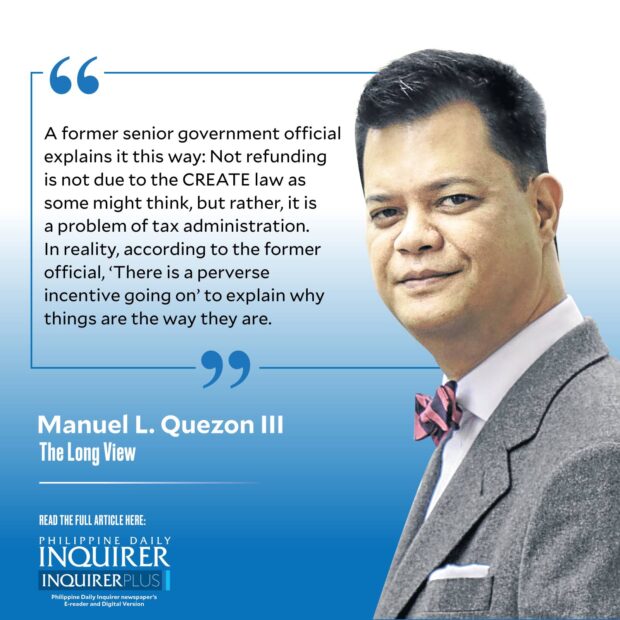Twisted genius

When Fumio Kishida became the first Japanese premier to address a joint session of our Congress, he wasn’t exaggerating when he said, “The relationship between Japan and the Philippines has made great strides over the past half century,” with a particular emphasis on growing defense ties. But part of the Japanese approach is to tout the benefits of increased Japanese investments. Here, however, the prospects may not be so rosy, as the Japanese prime minister surely knows and may have privately communicated to Filipino officials. At the very least, if a festering irritant isn’t resolved, it bodes ill for enticing investments, overall and not just from Japan.
Here’s the background, first brought to public attention by the retired investment banker Leo Alejandrino in his blog, “Heneral Lunacy.” In an Oct. 29 entry titled “Warning Signs,” the dramatic opening sentence was, “Our government is becoming known for not paying its bills.” According to Alejandrino, “Foreign chambers of commerce have publicly demanded the government pay them the [value-added tax] refunds owed them. One company alone has outstandings of [P3.8 billion.] Many of the companies are Japanese electronic exporters employing thousands of Filipinos and generating much-needed foreign exchange. They have threatened to pull out if the issue is not resolved. Japanese rarely speak out so the problem must be serious.”Alejandrino puts the problem in context in this way: “The foreign chambers have cited the VAT refund as a reason for international investors to avoid the Philippines when Vietnam, Indonesia, Thailand, and Malaysia are seeing massive inflows from suppliers relocating out of China. In 2022, the Philippines [foreign direct investments] dropped 22 [percent] to only $9.6 billion and have continued to fall this year.” Were you to go beyond foreign chambers of commerce and ask the natives, another part of the problem is the perception that the bureaucracy has become bolder about being greedy. But one doesn’t have to get mired in the hall of mirrors that is the perception game, you only have to look deeper into the question of why, in the first place, would government impose an (informal) policy of denying legitimate businesses refunds to which they are entitled by existing regulations?
A former senior government official explains it this way: Not refunding is not due to the CREATE law as some might think, but rather, it is a problem of tax administration. In reality, according to the former official, “There is a perverse incentive going on” to explain why things are the way they are.
Article continues after this advertisementIt works this way: The authorities set revenue targets for the Bureau of Internal Revenue (BIR) to meet. As it goes about its business, the BIR then embarks on being “strict” when it comes to collecting taxes and this includes how it goes about refunding VAT: it doesn’t.
When companies object, they have to go to the Court of Tax Appeals to question the BIR’s decision. This is costly. “So sometimes,” according to the ex-official, “companies would decide to ‘settle.’”
Here is where it gets truly perverse: If companies persist in going to court and if, by some miracle, they win, then “the refund will be reflected in the General Appropriations Act allocation of BIR.” In other words, having to pay out is OK because it does not affect BIR’s performance—as measured by its bosses. It’s an accounting trick but a politically important one.
Article continues after this advertisementConcludes the ex-official: “Thus, the optimal move of the BIR, given the current system, is to assess and deny refund.” Its overall collections look bigger, more impressive, and easier to achieve. This is what matters and a reality that has chambers of commerce angrily whispering in private, and companies threatening in private to leave, can do so all they want because of official window-dressing.
The former official is still hopeful that, “with all the new tax admin issuances and the amendment of the tax code w.r.t. refund, things will improve.” According to the former official, an attempt was made to simplify the requirements and the process for refunds. This was part of the “ease of paying taxes” bill which its proponents still hope will be enacted soon.
Of course, Alejandrino’s point goes beyond the woes of Japanese businesses here. According to him, the government is in arrears when it comes to paying travel tax refunds owed “balikbayans” (which is hurting tourism), Philippine Health Insurance Corp., and—this explains recent news items—military pensions; some agencies are getting only 30 percent of their budget while other appropriations have been drastically cut, too.
His damning conclusion: “Our economic managers have done a good job at masking our true state of affairs with opaqueness on governance and corruption, by talking up the economy, by playing with the numbers, by not servicing noninterest bearing payables, by kiting, by government providing inferior goods and services …” Guess when the government last became notorious for many of these practices? The original Marcos era.
—————
Email: mlquezon3@gmail.com; Twitter: @mlq3
















